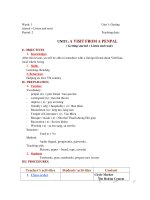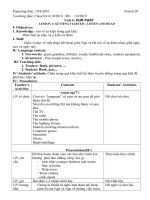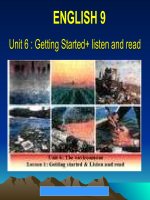- Trang chủ >>
- Y - Dược >>
- Y học công cộng
E9 W11 P21-22 UNIT 4 Getting started listen and read speak
Bạn đang xem bản rút gọn của tài liệu. Xem và tải ngay bản đầy đủ của tài liệu tại đây (156.71 KB, 9 trang )
<span class='text_page_counter'>(1)</span>UNIT 4 : LEARNING A FOREIGN LANGUAGE I.Objectives: 1. Topic:. Learning a foreign language. 2. Competencies: Expressing opinions. Seeking information for learning a foreign language. Giving advice to someone. Scan for specific information. Write a letter of inquiry. 3. Skills: Speaking:- Ask for and give information about language study /language courses - Express opinions / preferences - Talk about methods of study Listening: Listen to monologues / dialogues within 100-120 words for general or detailed information Reading: Read passages within 150-180 words for general or specific information Writing: Write a letter of enquiry within 80-100 words following a model and an outline given 4.Language focus: - “if ” with modal verbs: must, have to, should, might, ought to (to talk about conditions and results) - direct and reported speech: statements and questions 5. Vocabulary: - Words to describe school settings, study, courses, school life - Words to talk about language study: time-tables, courses, subjects, ways of learning, learning activities II. Unit plan: (6 periods) Period 20 - 25 Period 1 : Getting started- Listen and read Period 2: Speak Period 3: Listen Period 4: Read Period 5: Write Period 6: Language focus.
<span class='text_page_counter'>(2)</span> Period: 21. Date of planning: 11/11/2020. UNIT 4 : LEARNING A FOREIGN LANGUAGE LESSON 1 : Getting started, Listen and read A. The aims of the lesson 1. Knowledge + The aims: By the end of the lesson , Ss will be able to produce the questions for an oral examination. - Grammar: Direct and reported speech: statements and questions -Vocabulary: aspect, examiner, college, cadidate, written/ oral examination 2. Skills : - Practice listening, speaking, reading, writing. 3. Attitude: - Help ss to have good consciousness in order to practice reading for details about the questions in an exam. B. Preparations 1.Teacher : posters, computer, Lesson plan, textbooks, pictures, speaker, projector. 2. Students: Unit 4 C1-3 C. Methods: - Model-Talk-Practice, individual work, pair work - Some techniques can be used: Lucky numbers, Pre- questions, True - False statements, Role play. D. Procedure : I.Organization: ( 1 minute) - Greeting: Good morning! - Who’s absent today? Class Date of teaching Absent students 9A 15/11 9B 16/11 Teacher’s Activities II. WARM UP (5 minutes) Lucky numbers: - Write 10 numbers on the board, from 1 to 10. - Tell students each number is for a question but 4 of them are lucky numbers. If students choose a lucky number, they do not need to answer any questions but they get 2 points and they can choose another number. - Divide the class into teams. The temas take turn to. Students’ activities 1 6. 2 7. 3 8. 4 9. 5 10.
<span class='text_page_counter'>(3)</span> choose the numbers. - Tell students that they have to make questions about personal information when teacher gives them a word as a cue. E.g: Teacher : from Students: Where are you from? 1. Name ( What’s your name? ) 2. Lucky number 3. live ( where do you live? ) 4. live with (whom do you live with?) 5. Lucky number. 6. old ( How old are you? ) 7. Lucky number 8. learn English ( When did you start learning English? ) 9. Lucky number 10. hobbies (what are your hobbies?) III. NEW LESSON (36minutes) Step 1 : Pre Reading : 10’ 1. Vocabulary : 1. ( translation ) 2. (definition ): a person who ask questions (spoken or written) to find out how much a person know . 3. ( translation ) 4. ( example ) 5. ( definition) : one who takes part in an exam 6. ( translation ) - aspect ( n ): lĩnh vực, mặt, khía cạnh - examiner ( n ): giám khảo - coming ( adj ): sắp đến - college ( n ): trường Cao đẳng hay Đại học - candidate (n) : thí sinh - written examination: cuộc thi viết - oral examination: cuộc thi vấn đáp. Checking vocabulary: What and Where - Write the new words on the board, each word in each circle written exam. examiner. oral exam. coming. 1. Vocabulary : - aspect ( n ): lĩnh vực, mặt, khía cạnh - examiner ( n ): giám khảo - coming ( adj ): sắp đến - college ( n ): trường Cao đẳng hay Đại học - candidate (n) : thí sinh - written examination: cuộc thi viết - oral examination: cuộc thi vấn đáp. Sts : - listen. - listen and repeat (chorally then individually). - copy..
<span class='text_page_counter'>(4)</span> college. aspect. candidate. - Ask students to repeat the words chorally. - Rub out word by word but leave the circles. - Go on until all the circles are empty. - Get students to go to the blackboard and write the words in their correct circles. 2. Pre- questions - Set the scene: Lan is talking to Paola, a foreign student, about the oral examination that se has just taken. - Give students 2 questions ... - Have students work in pairs to answer them. - Give feedback. Step 2. While Reading :8’ 1. Reading and checking - Ask students to read the dialogue between Lan and Paola on page 32- 33 and check if their answers are correct or not. 2. Check (v) the boxes: - Get students to read the list of questions for the oral examination of Royal English College on page 33 . - Get them to read the dialogue again and decide what questions that the examiner asked Lan. - Let the students do the exercise individually then compare with their partners. .... - Ask students to find and compare the direct questions and the report speech in the dialogue. *Answer keys: 1. What is your name? → She asked me what my name was. 2. Where do you come from? → She asked me where I came from. 3. Do you speak any other languages? →She asked me if I spoke any other languages. 4. Why are you learning English? → She asked me why I was learning English. 5. How did you learn English in your country? → She asked me how I learned English in my country. 6. How will you use English in the future? → She asked me how I would use English in the. 2. Read : * Questions : 1. Were the questions in oral exam difficult or easy? 2. How many questions did the examiner ask Lan? Answers: 1. They are difficult ( according to Lan ) 2. About over 7 questions. Beside, she was asked to read a passage.. * Check (v) the boxes:. Answer keys: Questions : 1,2,6,7,8,9,10,14 ..
<span class='text_page_counter'>(5)</span> future. 7. What aspect of learning English do you find most difficult? → She asked me what aspect of learning English I found most difficult. 8. Read this passage.→ She asked me to read that passage. Step 3. Post Reading :8’ Speaking/ role play: 1. - Ask students to work in pairs to practice asking and answering. One students plays the role of examiner and another plays the role of Lan. - Call on some pairs to demonstrate before the class. - Give feedback and correct. 2. - Have students play the roles of Paola and Lan. - Call on some pairs to play the roles of Paola and Lan before the class. - Correct their pronunciation/ intonation. - Ask students to work in pairs to practice the dialogue. IV. SUMMARY (1 minutes) Reading a dialogue about the questions in an exam. V. HOMEWORK (2 minutes) - Ask students to write the direct questions and their reported speech in their notebooks. - Make 2 direct questions and change into reported speech. - Prepare the next lesson : Unit 4: Speak. 3. Speak :. 1. examiner Lan. 2. Paola Lan.. 4. Homework :. * Evaluation : ............................................................................................................................................... ............................................................................................................................................... ......................................................................................................................................... ............................................................................................................................................. ............................................................................................................................................. ........................................................................................................................................ Date of preparing: 11/11/2020. Period 22. UNIT 4 : LEARNING A FOREIGN LANGUAGE LESSON 2 : Speak.
<span class='text_page_counter'>(6)</span> A. The aims of the lesson 1. Knowledge + The aims: By the end of the lesson, students will be able to persuade friends to attend the school they like. * Expressions: (use to persuade someone to do something) - I think ....... - What do you think.....? - I agree/ disagree because..... - I don’t understand - Why don’t we/ you...... - I need......., we can....... - We should ....... - Let’s........... -Vocabulary: scholarship, advertisement, details, request, available, useful, wellqualified, beginner/intermediate/advanced, attend, improve, award, persuade, experience, offer, supply, ... 2. Skills : - Practice listening, speaking, reading, writing. 3. Attitude: - Help ss to have good consciousness in order to practice reading for details about the questions in an exam. B. Preparations 1.Teacher : posters, computer, Lesson plan, textbooks, pictures, speaker, projector. 2. Students: Unit 4 Speak C. Methods: - Help ss to have good consciousness in order to practice speaking D. Procedure : I.Organization: ( 1 minute) - Greeting: Good morning! - Who’s absent today? Class Date of teaching 9A 16/11 9B Teacher’s activities II. WARM UP (5 minutes) Pelmanism - Prepare ten cards with number ( from 1 to 10 ) on one side and the name of coutries and their capitals on the other. - Stick ten cards on the board so that the students. Absent students. students’ activities.
<span class='text_page_counter'>(7)</span> can only see the numbers, make sure the words are mixed up. - Divide the class into two teams and ask students to choose two numbers, turn the cards over. If they match (e.g: US - Washington DC ), that team gets one mark. If not, turn the cards over again and ask the next tem to continue. - Go on until all the cards are turned over . The team which has more marks wins the game. III. NEW LESSON (35minutes) Step 1. Presentation : (8’) 1. Vocabulary : - scholarship ( n ): học bổng (definition) : a payment of money to a clever students - abroad ( adv ): ở nước ngoài - persuade ( v ): thuyết phục - dormitory: ký túc xá, nhà ở tập thể to enable him to continue his studies. - campus ( n ): khu trường học (example ) definition):the grounds of a school,college or university - reputation ( n ): danh tiếng ( translation ) ( synonym: fame, honor ) ( translation ) - native speaker ( n ): người bản xứ (nói tiếng bản địa) ( definition) : a person who speaks his mother tongue. * Checking vocabulary: Slap the board. - Put the new words all over the blackboard. - Call two students or two teams of students to the front of the class. Make sure they stand at an equal distance from the board. - Call out one of the new words ( in Vietnamese ) in a loud voice, the two students must run forward and slap the word on the blackboard. The one who first slaps the correct word is the winner. If the students play in team, the winning teams gets one mark. Then ask two more students to come. England. Canberra. Australia The USA China. Beijing London Washington DC Wellington. New Zealand. 1. Vocabulary : Sts : - listen. - listen and repeat (chorally then individually). - copy..
<span class='text_page_counter'>(8)</span> forwards, etc native speaker. persuade reputation scholarship. Abroad. dormitory. campus. 2. Setting the scene: “ Tomorrow is Sunday. Lan and her friends want to go somewhere. Lan enjoys going to the seaside. What does she say to persuade her friends to go with her to the seaside?” “ I think we should go to the seaside.”. “ Why don’t we go to the seaside?”. “ If we go to the seaside. we can swim and sunbathe”. - Remind students of the expressions that they can use to persuade someone to do something. ..... 2. Speak : * Expressions: (use to persuade someone to do something) - I think ....... - What do you think.....? - I agree/ disagree because..... - I don’t understand - Why don’t we/ you...... - I need......., we can....... - We should ....... - Let’s............ Step 2. Practice : 17’ - Divide the class into groups of three. * Situations on page 34 . - Ask students in groups to play the roles of Thu, Tam and Kim. They are awarded a scholarship of Students in groups to play the US$ 2000 to attend an English language summer roles of Thu, Tam and Kim. course abroad. Each person tries to persuade his/her friends to attend the school s/he likes to go to. - Have students read the three advertisements to get information. Eg: * Thu - the Brighton Language Center UK. I think we should go to the Brighton Language Center in the UK. Because the school there has excellent reputation and we can live in the dormitory on campus. * Tam - Seattle School of English - USA. Why don’t we go to the Seattle School of English in the USA? You can stay with Vietnamese friends. They will help us a lot..
<span class='text_page_counter'>(9)</span> * Kim - Brisbane Institute of English - Australia What do you think about the Brisbane Institute of English in the Australia? It is quite close to Vietnamese and the course is the cheapest. - Call on some groups to demonstrate before the class. - Let the students work in groups, practice persuading their partner using the expressions in the box on page 34 and the information in the three advertisements. Step 3. Production :(10’) - Students to discuss about this topic “ What will you do on Tet holiday? Some one of your friends want to go to the Spring Fair. Others want to spend their holiday with their grandparents in the countryside, etc. - Get students to work in groups of 3, persuading others to do that he/ she prefers.. What will you do on Tet holiday?. IV. SUMMARY (2 minutes) - Speaking to persuade someone to do something. V. HOMEWORK (2 minutes) - Ask students to write a short paragraph about the reasons why they learn English. E. Evaluation : ............................................................................................................................................. ............................................................................................................................................. .................................................................................................................. ............................................................................................................................................. ............................................................................................................................................. ...................................................................................................................
<span class='text_page_counter'>(10)</span>









